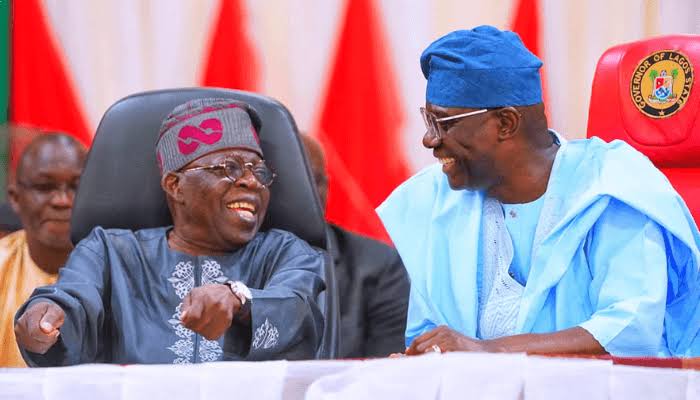President Bola Tinubu announced a reconciliation with Lagos State Governor Babajide Sanwo-Olu, stating that any past grievances had been resolved during a significant meeting with the Governor’s Advisory Council (GAC) in Lagos. The meeting, held at the State House in Marina, was part of a Sallah homage visit led by GAC Chairman Alhaji Tajudeen Olusi, who sought to mend any perceived rifts between the president and the governor. Tinubu’s declaration, “It’s all over now, all is forgiven,” underscored a commitment to unity within the Lagos chapter of the All Progressives Congress (APC), dispelling rumors of lingering tensions.
The GAC, a powerful advisory body within Lagos APC politics, approached Tinubu to plead for forgiveness on behalf of Sanwo-Olu and other party members who might have caused offense, intentionally or otherwise. Sources indicate that the council’s visit was a strategic move to reinforce solidarity ahead of future political engagements, with the Sallah occasion providing a culturally significant backdrop for reconciliation. The absence of specific details about the nature of the disagreement reflects the delicate handling of internal party dynamics, with the focus placed on moving forward rather than revisiting past disputes.
In a symbolic gesture of humility and respect, Governor Sanwo-Olu, alongside several GAC members, reportedly prostrated before President Tinubu during the meeting, a traditional Yoruba act signifying remorse and deference to authority. This display was interpreted as a public affirmation of loyalty to Tinubu, a key figure in Lagos and national APC leadership, and a signal to party faithful that unity had been restored. The presence of prominent GAC figures, including former commissioners and party stalwarts, further emphasized the weight of the occasion and its implications for Lagos’ political landscape.
The reconciliation comes at a critical time as Lagos prepares for upcoming political activities, including local government elections and broader party congresses. Analysts suggest that Tinubu’s public forgiveness of Sanwo-Olu serves to strengthen the APC’s cohesion in Lagos, a state that remains a political stronghold for the party. The meeting also highlighted Tinubu’s enduring influence over Lagos politics, with the GAC acting as a bridge between the state’s executive leadership and the president’s national authority.
Political observers note that such reconciliations are common in Nigeria’s complex political environment, where personal and party loyalties often intersect. The Sallah homage provided a culturally resonant platform for this resolution, aligning with traditions of forgiveness and unity during festive periods. Tinubu’s statement and the GAC’s actions are likely to resonate with APC supporters, reinforcing the narrative of a united front as the party navigates Nigeria’s challenging political terrain.
The meeting’s outcome has been widely reported as a positive development for Lagos APC, with party members expressing optimism about strengthened leadership and coordination. Sanwo-Olu’s administration, which has focused on infrastructure development and economic growth, benefits from this renewed alignment with Tinubu’s national leadership. The reconciliation also quells speculations about internal fractures that could have weakened the party’s position in Lagos, a state critical to the APC’s national strategy.
Public reactions, as noted reflect a mix of support for the reconciliation and curiosity about the underlying issues, though no verified details have emerged. The lack of transparency about the original dispute aligns with the APC’s preference for resolving internal matters privately, ensuring that public messaging remains focused on unity and progress. This approach, while effective in maintaining party discipline, leaves room for ongoing speculation among political analysts and the public.
The GAC’s role in facilitating this reconciliation underscores its influence within Lagos’ political structure, serving as a stabilizing force within the APC. Comprising elder statesmen and experienced politicians, the council’s intervention highlights the importance of traditional and institutional mechanisms in resolving disputes within Nigeria’s political elite. For Sanwo-Olu, the public endorsement from Tinubu and the GAC bolsters his administration’s legitimacy and strengthens his position as he continues to implement key projects in Lagos.
Looking ahead, the reconciliation is expected to pave the way for smoother collaboration between the state and federal levels of government, particularly on initiatives requiring joint efforts, such as urban development and economic policy implementation. Tinubu’s forgiveness of Sanwo-Olu not only resolves any personal or political tensions but also sets a tone of cooperation that could influence other APC-controlled states. As Lagos remains a bellwether for Nigeria’s political and economic trends, this development is likely to have broader implications for the APC’s national strategy in the lead-up to future elections.




